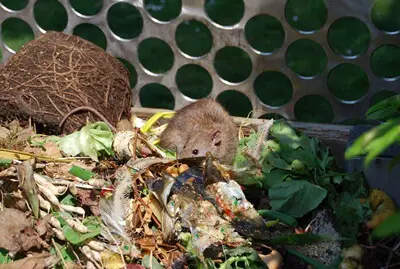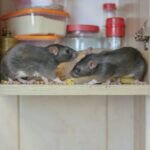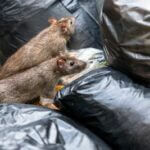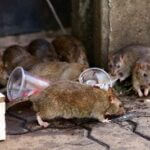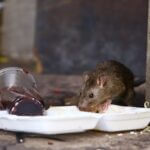Composting helps the environment and is a great way to make nutrient-dense fertilizer for your garden. However, you may be worried about your compost attracting rats.
Rats are attracted to compost bins since they contain leftover food and are rarely disturbed.
The food produces a strong scent that rats are attracted to, especially dairy products. Rodents readily feed on the fermenting leftovers, making compost bins vulnerable to rat infestations.
The best way to prevent rats in your compost bin is to not add cooked food and dairy.
Food scraps should also be placed deep inside the compost bin so that it doesn’t release smells into the air. Compost bins that are completely closed, like compost tumblers, are also recommended.
Do Compost Bins Attract Rats?
Compost bins are dry and contain exposed food that will produce smells that rats find appealing, drawing them in from miles around.
However, compost bins that are well maintained and placed in a clean garden won’t attract rodents.
Do Eggshells In Compost Attract Rats?
Eggshells may seem harmless to the compost, but they can attract rats.
They’re often left with egg residue, and when this residue dries, it creates a strong odor that can be a beacon for rodents.
Also, eggshells take a long time to decompose. According to the Tennessee Research and Creative Exchange, eggshells are common in archeological digs because they’re made of the same compounds as bones.
Specifically, eggshells are composed primarily of calcium carbonate. Unfortunately, this mineral is stable and doesn’t break down into individual components.
In the compost bin, eggshells can stay intact for a long time, leaving plenty of time for rats to smell the residue on the shells and make their way into your compost bin.
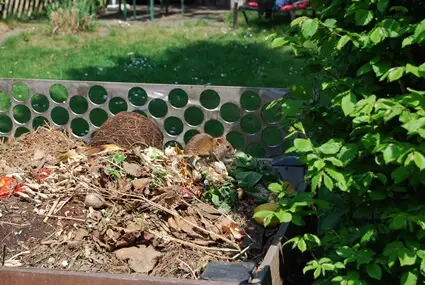
Do Rats Eat Compost Worms?
Rats are omnivores and opportunistic feeders. So, they’ll eat plant and animal matter as long as they can access it. Anything edible in your compost heap will be appealing, including compost worms.
This can be terrible for those who use worms in their compost. Worms can be beneficial for gardening, making compost more nutrient-rich and helping to break down waste.
However, rats don’t seek out worms, mostly because they don’t give out a scent that attracts rats. Instead, rats are drawn to compost bins because of the smell of food.
As opportunistic feeders, rats will incorporate the worms they find in your bin into their diet.
Do Rats Nest In Compost Heaps?
Compost heaps are warm, dry, and contain food, making them an attractive nesting site. This is true, especially in the colder months when dry and warm places are scarce.
A tell-tale sign of a nest in your compost bin is the presence of rat tunnels. Also known as rat runs, you will notice these burrows leading into the compost bin or the soil directly beneath the bin. You may also notice these tunnels along fences, walls, and foundations.
Do Rats Burrow Into Compost Bins?
A common sign that your compost bin has been infested is a tunnel at the base of the bin. This tunnel will be about 1 inch or 1.5 inches in diameter.
Not all rat species make tunnels, but some of the most common rat species do. For example, the brown rat, also known as the Norwegian rat, is known for making tunnels underground. In contrast, the black rat prefers nests instead of tunnels.
Rat Chewed Through Compost Bin
It might seem like a solid wood, or plastic compost bin will keep rats out. However, this isn’t enough to stop rats from entering your compost, as rats can chew through such bins.
As they grow, rats must constantly chew on various materials to keep their teeth sharp and short. This gives them the instinct to chew through whatever is between them and their food.
Even some forms of metal won’t be able to keep a rat out, such as aluminum foil. If a rat can reach the bin, it will figure out how to get inside.
Can I Use Compost That Rats Have Lived In?
Rats add bacteria to compost, but the bacterial load will drop significantly once the compost has been added to the soil. Eating cooked/cleaned veggies and plants grown in this soil is safe.
Nonetheless, be careful when handling contaminated compost. If you find rats in the pile, the chances are that there’s rat urine in the compost. Never handle contaminated compost with your bare hands. Always wear gloves, especially if you have cuts or scrapes on your skin.
The main danger from rat urine is leptospirosis, which comes from the leptospira bacteria. According to The Science of Nature, the presence of rats increases the risk of leptospirosis.
The most common symptoms of infection are headaches, chills, and muscle pains. However, severe infections can be life-threatening, with symptoms including organ failure and internal bleeding.
Can You Use Rats For Compost?
It may be tempting to allow rats inside your compost bin. After all, compost contaminated by rats is still safe to use in the garden. However, there are other risks to consider.
Other than leptospirosis, rats carry a host of diseases, including:
- Hantavirus
- Salmonella
- Lymphocytic choriomeningitis virus (LCMV)
Rats carry the bacteria responsible for the three common types of plague: bubonic, pneumonic, and septicemic. Specifically, rats carry the bacteria Y. pestis, which is responsible for these illnesses.
While your compost’s ability to be used in a garden may be unaffected by their presence, rats can make the surrounding area a breeding ground for bacteria.
This increases the chances of accidentally getting infected when interacting with this area. That makes it smart to remove the rodents as quickly as possible to be safe.
How To Deter Rats From Compost Bins
Rats like compost bins because it provides both shelter and food. Thankfully, there are many ways to stop rats from entering your compost bin.
Don’t Add Cooked Food or Dairy
Cooked food, especially meat, is attractive to rodents. This includes dairy, which gives off a pungent smell that can draw in rats.
With that said, any food scrap can attract desperate rats. If you need to add food to your compost, bury it deep inside the heap to stop it from releasing odors into the air. Fresh food waste should be buried about 6 inches deep.
Compost that contains food should be covered with fresh compost. This is especially true for open pile systems, where nothing else provides cover for your compost. The fresh compost will stop the odors from escaping, making it less likely for rodents to find the fruit.
Remove Other Sources Of Food Nearby
The trick is to remove anything that can attract rats from the immediate area. Pay attention to the sources of food inside and around it.
Here are some pointers to keep in mind:
- Fallen fruit and vegetables should be picked up immediately.
- Chicken coops, because of chicken feed, are also attractive to rats. If you keep chickens, you should rat-proof your chicken coop.
- Bird feeders are a common reason for rat infestations. If you have a bird feeder, ensure it’s placed on a surface where you can easily sweep away seeds. Remove birdseed at night.
- Pet poop lying around the area can also provide a food source for rats and should be cleaned up immediately.
- Likewise, pet food can also attract rats, so seal it tightly or keep it indoors.
- Keep garbage cans tightly sealed.
Use Enclosed Bins
Rats will create shelter in dry and dark containers, preferably in quiet areas.
This makes bins and containers a perfect space for rats to nest in. Compost bins are particularly susceptible to rat infestations, and some designs are more secure than others. Tumbling compost bins, for example, are fully enclosed and keep rats away better than other designs.
Ideally, all other containers should also be enclosed. If possible, keep these containers indoors. Food containers, like bird seed and pet food, are particularly suspect. However, even toolboxes and cabinets placed outdoors can harbor rats in the right circumstances.
All other containers, especially garbage bins, should be completely closed.
Raise The Bin Off The Ground
Rats often enter compost bins by burrowing in from the bottom and sides.
Raising the bin off the ground is a great way to prevent rats from entering. This is partly why compost tumblers are more effective against pests, as they are often raised from the ground.
Cover The Bottom Of The Bin
If you don’t have a compost tumbler, you can still use methods to prevent rats from entering. The first is placing the bin on top of a solid surface, like concrete, or creating a base of bricks.
Otherwise, you can also line the bottom of the bin with wire mesh. Rats can enter spaces as small as ¼ of an inch, so use 18-gauge to 22-gauge wire to keep them out. When using wire mesh, cover the sides of the bin.
Keep Bin Moist
Rats need dry shelter, so keep your compost bin moist. Moist compost bins are also efficient composts, as moisture helps break down matter into nutrients.
To keep compost bins moist, regularly spray the bin with water, or add composting materials with a high water content. Experts believe that a moisture level of about 60% is ideal.
Keep Your Garden Clean
Harborage, or any materials that can house rats, are common in unkempt gardens. Simply keeping a garden clean may remove hiding spots and sources of shelter for rats.
For example, dense vegetation, like overgrown grass and weeds, are common hiding places for rats.

Remove Rat Urine From Surfaces
Rats mark their territories using urine. A rat urine smell signals other rats that the area is safe for them and contains food. Unless you remove this smell, more rats will come into your garden.
To remove the smell of rat urine, power wash hard surfaces to eliminate the smell. Likewise, remove other signs of rat activity, like droppings and nests.
Put Bins In Open Areas
Don’t put your compost bin against a wall or fence. Rats tend to stick against surfaces so that they can hide better. Placing bins near these areas makes it easier for rats to access your bins.
If possible, put your bin in areas with a lot of foot traffic, as this can provide noise that will deter rats. It’s also a good idea to disturb the bin with a tap of a stick or a small kick every time you pass it by.
Encourage Predators
There are many natural predators that you’ll want in your garden. Some rat predators, like foxes, may naturally wander into your yard, so allow them to wander around to scare off any potential pests.
You can also erect nest boxes for owls in your area, like the tawny owl and barn owls. Likewise, leave the lower branches of trees intact to allow birds to perch.
If possible, consider adopting a pet to help with your rat problem. Cats are excellent rat hunters, but some dog species can also be excellent ratters. Schnauzers, for example, have been bred to deter rats from farms and can deter them from your garden.
While pets can be useful for deterring rats, don’t expect them to remove the pests independently. Rat hunting can be dangerous to your pet. Also, pet keeping may attract rats because of their food and poop. Only use pets as a supplement to other methods.

